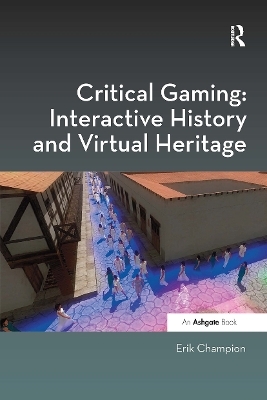
Critical Gaming: Interactive History and Virtual Heritage
Seiten
2024
Routledge (Verlag)
978-0-367-59821-1 (ISBN)
Routledge (Verlag)
978-0-367-59821-1 (ISBN)
The inter-relationship between digital humanities and digital games is surprisingly seldom investigated. This book explains how games and virtual environments can be used in teaching and research to critique issues and topics in virtual heritage and interactive history. Individual chapters highlight the importance of visualisation, rituals, role-pl
This book explains how designing, playing and modifying computer games, and understanding the theory behind them, can strengthen the area of digital humanities. This book aims to help digital humanities scholars understand both the issues and also advantages of game design, as well as encouraging them to extend the field of computer game studies, particularly in their teaching and research in the field of virtual heritage. By looking at re-occurring issues in the design, playtesting and interface of serious games and game-based learning for cultural heritage and interactive history, this book highlights the importance of visualisation and self-learning in game studies and how this can intersect with digital humanities. It also asks whether such theoretical concepts can be applied to practical learning situations. It will be of particular interest to those who wish to investigate how games and virtual environments can be used in teaching and research to critique issues and topics in the humanities, particularly in virtual heritage and interactive history.
This book explains how designing, playing and modifying computer games, and understanding the theory behind them, can strengthen the area of digital humanities. This book aims to help digital humanities scholars understand both the issues and also advantages of game design, as well as encouraging them to extend the field of computer game studies, particularly in their teaching and research in the field of virtual heritage. By looking at re-occurring issues in the design, playtesting and interface of serious games and game-based learning for cultural heritage and interactive history, this book highlights the importance of visualisation and self-learning in game studies and how this can intersect with digital humanities. It also asks whether such theoretical concepts can be applied to practical learning situations. It will be of particular interest to those who wish to investigate how games and virtual environments can be used in teaching and research to critique issues and topics in the humanities, particularly in virtual heritage and interactive history.
Erik Champion is Professor of Cultural Visualisation at the School of Media, Culture and Creative Arts, Curtin University, Australia.
Introduction; Chapter 1 Digital Humanities and the Limits of Text; Chapter 2 Game-based Learning and the Digital Humanities; Chapter 3 Virtual Reality; Chapter 4 Game-based History and Historical Simulations; Chapter 5 Virtual Heritage and Digital Culture; Chapter 6 Worlds, Roles and Rituals; Chapter 7 Joysticks of Death, Violence and Morality; Chapter 8 Intelligent Agents, Drama and Cinematic Narrative; Chapter 9 Biofeedback, Space and Place; Chapter 10 Applying Critical Thinking and Critical Play;
| Erscheinungsdatum | 01.07.2020 |
|---|---|
| Reihe/Serie | Digital Research in the Arts and Humanities |
| Verlagsort | London |
| Sprache | englisch |
| Maße | 156 x 234 mm |
| Gewicht | 640 g |
| Themenwelt | Schulbuch / Wörterbuch ► Lexikon / Chroniken |
| Geisteswissenschaften ► Archäologie | |
| Informatik ► Software Entwicklung ► Spieleprogrammierung | |
| Sozialwissenschaften ► Kommunikation / Medien ► Buchhandel / Bibliothekswesen | |
| ISBN-10 | 0-367-59821-3 / 0367598213 |
| ISBN-13 | 978-0-367-59821-1 / 9780367598211 |
| Zustand | Neuware |
| Informationen gemäß Produktsicherheitsverordnung (GPSR) | |
| Haben Sie eine Frage zum Produkt? |
Mehr entdecken
aus dem Bereich
aus dem Bereich
Buch | Softcover (2021)
BILDNER Verlag
CHF 31,90
das umfassende Handbuch
Buch | Hardcover (2024)
Rheinwerk (Verlag)
CHF 69,85


